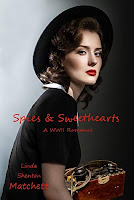Despite the moniker, sweetheart jewelry wasn’t given to just girlfriends. Mothers and sisters also received items from sons and brothers. Brooches, pendants, and bracelets were the most popular pieces, but with many base metals being tightly rationed, the jewelry was manufactured with Bakelite (a resin), celluloid, wood, mother-of-pearl, shell, ivory, rhinestones, enamel, and sometimes wire. Because sterling silver wasn’t rationed, the metal became popular among jewelers. Rarer pieces were made with platinum, silver plate, brass, gold plate, gold-filled, and even solid gold.
There are three main reasons the jewelry was popular.
- First and perhaps foremost, it was fashionable. With rationing restricting the ability to purchasenew clothes and accessories, sweetheart jewelry allowed an individual to “bling” up their old outfits.
- Second, sweetheart jewelry allowed individuals to display their patriotism. Many of the pieces featured military insignia and other icons related to a loved one’s branch of service, with the flag and the American eagle most often depicted. Uncle Sam’s top hat, bows mimicking ribbon of the stars and stripes, and the victory “V” were also favorite designs. Several of the costume jewelry manufacturers of the time, including Trifari and Coro, made patriotic-themed pieces. Unsurprisingly, red, white, and blue were the most often used colors in jewelry.
- Third, sweetheart jewelry was popular because it reflected a sense of service. Women proudly wore the pin version of a man-in-service flag, the blue star in the center on a white background with a red border, to indicate a son or husband in service. The service pins, more rarely, could have two or three stars, and rarer yet, could contain a gold star to indicate a death in service.
_____________________
Spies & Sweethearts (Sisters in Service, Book 1)
She wants to do her part. He’s just trying to stay out of the stockade. Will two agents deep behindenemy lines find capture… or love?
1942. Emily Strealer is tired of being told what she can’t do. Wanting to prove herself to her older sisters and do her part for the war effort, the high school French teacher joins the OSS and trains to become a covert operative. And when she completes her training, she finds herself parachuting into occupied France with her instructor to send radio signals to the Resistance.
Major Gerard Lucas has always been a rogue. Transferring to the so-called “Office of Dirty Tricks” to escape a court-martial, he poses as a husband to one of his trainees on a dangerous secret mission. But when their cover is blown after only three weeks, he has to flee with the young schoolteacher to avoid Nazi arrest.
Running for their lives, Emily clings to her mentor’s military experience during the harrowing three-hundred-mile trek to neutral Switzerland. And while Gerard can’t bear the thought of his partner falling into German hands, their forged papers might not be enough to get them over the border.
Can the fugitive pair receive God’s grace to elude the SS and discover the future He intended?
Purchase Link: https://books2read.com/u/m0Od9l
Linda Shenton Matchett writes happily-ever-after historical Christian fiction about second chances and women who overcome life’s challenges to be better versions of themselves.
Whether you choose her books set in the Old West or across the globe during WWII, you will be immersed in the past through rich detail. Follow the journeys of relatable characters whose faith is sorely tested, yet in the end, emerge triumphant. Be encouraged in your own faith-walk through stories of history and hope. Visit her at www.LindaShentonMatchett.com
Photos: Courtesy of the Wright Museum







Thank you for this blog! It would be fun to find a piece of this!
ReplyDeleteI never heard of Sweetheart Jewelry until today. Very interesting. Thank you
ReplyDelete